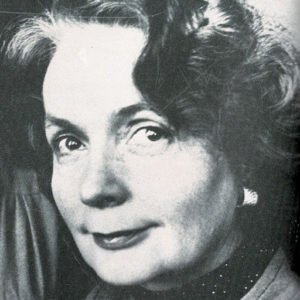Remembering Lucilla Andrews
 Frances Duncan, longtime friend and neighbour of Lucilla Andrews, shares some lovely memories.
Frances Duncan, longtime friend and neighbour of Lucilla Andrews, shares some lovely memories.
How and when did you meet Lucilla?
I first met Lucilla in 1969 when she came from England to live in Edinburgh. She moved into the house next door to my family. I was 14 years old at the time.
What were your first impressions of her?
My first impressions of Lucilla were that she was a friendly and considerate lady and a good neighbour. I thought that she was rather exciting – the fact that she was glamorous, a writer and had a daughter at Cambridge University must have added to this. I remember thinking that she was a lot nicer than most of my parents’ friends and that she enjoyed speaking to children of all ages. She did not mind when my brothers, sister and I climbed over the fence into her garden to retrieve footballs and tennis balls and she was very good about my brother accidentally hitting a golf ball through her kitchen window! We knew that Lucilla was a writer and we could hear her typewriter from our back garden. I had no idea at this stage how successful an author she was.
How did your friendship develop over the years?
Lucilla and I became friends when I was 16. I came home from a party at about 7am one morning and hoped that no one would spot me as I was supposed to be at home in my bed. Lucilla was out walking her beautiful Alsatian, Bodie. When I told her about the party, she said it sounded terribly exciting but she looked rather worried. She invited me to afternoon tea. From there a wonderful friendship began that was to last until the time Lucilla died in 2006.
When did you first read one of her books, and which one was it? Have you read all/many of her books, and if so, do you have a favourite?
Lucilla first gave me one of her books to read – The Print Petticoat– when I was a teenager. I loved the book and was keen to read more. Over the years I read all of her novels. My favourites were The First Year and My Friend the Professor. The heroines in both of these books are bright, strong teenagers and I felt that I could relate to them. I also enjoyed Highland Interlude as I love the Highlands and was pleased that Lucilla had chosen to have a highlander as one of her main characters.
As my friendship with Lucilla developed, I realised that making a living from writing is not easy. Lucilla worked long hours and often had to rewrite chapters many times before she was satisfied with them. I also learned that there was a lot of research to be done before the writing started.
I was interested when Lucilla told me that she followed Jane Austen’s example of not including dialogue between men when women were not present. She felt she did not have personal experience of this.
You describe Lucilla as wise and funny. Can you give us some insight into this?
Lucilla lived on her own in Edinburgh as her daughter was at university in England. She enjoyed solitude and spent much of her time writing, gardening and keeping up with current affairs. She did not make decisions or answer questions in haste. ‘Let’s think about this one’ was one of her favourite expressions. She was a good listener and liked to talk things through. She encouraged me to think for myself rather than follow the herd. Murrayfield was a Tory stronghold in those days and Lucilla was a socialist. ‘It does not matter how you vote – and you must vote as women have died to give you that right- as long as you make an informed choice.’
I remember bumping into Lucilla as she was making her way to the local bank. She was looking very elegant . She told me that she needed to borrow some money. ‘A tip for the future, darling. When asking for money, look as though it is the last thing you need.’ In later life, I was surprised to learn that the most Lucilla earned in a year from writing was £12,000. I had assumed that all successful writers were wealthy.
Can you share with us any memories of Lucilla speaking at your wedding?
When I married, it was customary for an uncle to give a speech about the bride. I wanted Lucilla to take on this role as she knew me better than any of my uncles. Her speech was touchingly kind yet funny. She took the audience through the highs and lows of adolescence, school, university and career choices. Looking back, Lucilla would far rather have not made a speech but she managed to look genuinely delighted when I asked her – ‘I would love to , darling. That would be splendid!’ Many years later I spoke at Lucilla’s memorial service. This was a great honour but also quite daunting and I was reminded of Lucilla’s earlier generosity.
How did you get involved in helping to research No Time for Romance?
One day when I was having tea with Lucilla I noticed that her study was messier than usual. The filing cabinet was open and odd letters and bits of paper were scattered over the floor. Lucilla explained that, as a young nurse during the war, she decided that she was going to write about her experiences. She kept articles, notes and stories of her experiences throughout her adult life but these were in a ‘dreadful muddle’ in her filing cabinet and she needed to sort them out. She asked me if I would like to help her and I agreed immediately. It was fascinating to see how much preparatory work went into writing a book. There were accounts of Lucilla’s training as a nurse, her thoughts about fellow nurses and doctors and many notes about the resilience and courage of her patients. It was a very special moment when Lucilla gave me a signed copy of No Time for Romance. This was the book that she had wanted to write since she was in her early twenties and here it was in print almost forty years later. Although I enjoyed Lucilla’s novels, NTFR is the book that I treasure most.
Can you tell us anything about Lucilla’s first novel which was destroyed by her head mistress?!
Lucilla told me that she started writing stories when she was a teenager at boarding school. She wrote by torchlight under her covers after ‘lights out’. Her first ‘novel’ was a love story about a Spanish count and Lucilla was rather pleased with it. However, the novel was discovered and her head mistress tore it up as it was NOT NICE! Lucilla told me that she was angry but not too upset as her head was full of stories. I would love to be able to read this early novel. I wonder if the head mistress lived to see Lucilla’s name in print?
What are your abiding memories of Lucilla?
My abiding memories of Lucilla are of an intelligent, kind and compassionate lady. She had a very close relationship with her daughter, Vee. I remember her delight and pride as she watched Vee’s impressive career progress. I also remember the calm dignity and strength she showed during the final stages of Vee’s life as she battled with cancer. She told me ‘losing a child is agony, and it does not get better after a year, it gets worse. However I still find life interesting so one must cope.’ Around this time Lucilla came for lunch. My son, who was home from university, went to meet her from her taxi. He was in ‘dutiful son’ mode. By the time they reached the door of my flat they were friends. They were laughing about one of the famous politicians of the day and Chris had been invited to Lucilla’s house to take any of Lucilla’s many history books that were of interest to him. During lunch I watched this beautiful lady and my son enjoy each other’s company even though Lucilla was grieving for her daughter and thought how privileged I was to have been part of her life.
How do you think she would feel about her books finally being made available for dedicated readers and a whole new generation?
Lucilla would be delighted that her books are finally being made available for dedicated readers and a whole new generation. She was a wonderful writer and all of her books are not only very enjoyable but also give an insight into hospital life during her lifetime.



